- Home
- Trevor Wyatt
First Contact: A Pax Aeterna Novel (Call of Command Book 1) Page 6
First Contact: A Pax Aeterna Novel (Call of Command Book 1) Read online
Page 6
There were nods and murmurs of agreement around the table.
“And just showing up wouldn’t be a coincidence,” Eiléan said. “They can deduce that we’re either able to communicate over interstellar distances, or else we’re an immediate follow-up force such as might normally be sent.”
“Possible, possible,” Jeryl said, stroking his chin. “And your other reason, Commander Gavin?”
She shrugged. “They’re exactly what they seem to be.”
“Wait, what are you saying? That this ship isn’t responsible for blasting The Mariner?”
“That’s right.”
“Oh, now, wait a minute,” Dr. Lannigan put in. “Just wait. You’re saying that there’s another intelligent species in the area?”
“I don’t know,” Ashley said. “I know it sounds silly...”
“Boy, does it ever,” said Dr. Rigsang, who hadn’t said one word thus far. “Do you have any idea what the odds against that are?”
“I don’t know, and I don’t want to know,” she said. “It’s a crazy universe out there, Doctor.”
“I think I get your reasoning,” Jeryl said. “The aliens seem to have deliberately made it hard to decipher their communications, burying them in a carrier wave. I have a hunch that they’re not much more advanced than us, if they’re using that methodology. I mean to say, we’re not dealing with godlike powers.”
“Right,” Ashley said. “They haven’t teleported over here, or sent a software avatar or something...they’re barely past the dot-and-dash stage, like us.”
She shrugged again. “Figuratively speaking.”
“We’re more or less equals,” Jeryl replied, thinking about it. “In terms of cultural and technological development.”
“That’s how I read it,” she told him. “And they could be terrified. Let’s assume for a moment that they didn’t destroy The Mariner. We could well be looking for any excuse to blow them to atoms—how are they to know?”
“This is damn confusing,” The Captain said, unable to keep an edge out of his voice. “Wait, though; what if they put The Mariner through this same examination? This series of puzzles?”
Ashley shook her head slowly.
“If they did, they were probably wasting their time,” she said. “She isn’t carrying the kind of equipment we are...She isn’t more than a scout ship, really, with no room for more than one AI and not much in the way of weapons. Gunny?”
“Ma’am?”
“What were The Mariner’s offensive and defensive capabilities?”
“Standard CP beams and lasers, nothing that could stand up to a ship that size,” said the armory AI.
“Standard screens.” There was a blip of static that signified a shrug.
“They could have smashed her flatter than piss on a plate, excuse my French.”
Ashley turned to the Captain. “So there you go, sir. The Mariner probably never got past the signal buried in the carrier wave. All she would have seen was the carrier wave itself, which doesn’t carry any information. Sure, she’d have known that she was facing an intelligent alien...but she probably wouldn’t have been able to talk to it. And you heard Gunny. If the alien took offense, or got nervous...”
She lifted her eyebrows. “Goodbye, Charlie.”
Jeryl heaved a sigh and sat silently for so long that some of the others start to fidget. He couldn’t help it; his wheels turned slowly when faced with a serious problem.
And this is possibly the most serious problem the human race has ever faced, he thought. If the aliens are smart enough to somehow trace us back to Sol System who’s to say that they won’t send their own armada?
He sat quietly, turning all this over in his head. At last he spoke, quietly:
“Lieutenant Taylor.”
“Sir?”
“You can reply to them, can’t you?”
“I can.”
“Good. Then here’s what we’re going to do. I want you to craft a response that’s neutral in tone...we’re not angry or confrontational; we’re not jumping for joy at finding other intelligent life forms. This is a purely mundane exercise for us. Savvy?”
“Yes, sir.”
“Good. How long will it take you to do that?”
She licked her lips. “I can uh, I can do it now, if you’ll give me fifteen minutes. I’ll run it by you of course, before I send it.”
“Perfect. Do it.”
Jeryl pushed back from the table. “The rest of you, to CNC right now. I want everyone in on this.”
No one spoke a word, but they all followed him out of the conference room and into CNC.
He didn’t believe he was the only person who was sweating.
I hope to hell I know what I’m doing, Captain Jeryl thought.
Chapter 11
Ashley
Once they were all at their stations in CNC, Ashley saw Mary pick up her earbuds prior to composing the message as directed by Jeryl.
“Belay my previous order, Lieutenant,” said Jeryl at that very moment.
Mary paused, her hands poised over her entry tablet. “Sir?”
“I’m not feeling very neutral right now. So here’s what I want you to say: ‘I am Jeryl Montgomery, captain of this vessel. We’re investigating the disappearance of our scout ship. We found its wreckage. If you know anything about how our people met their demise, I request information. If you caused the deaths of our people, I demand to know why.”
No one in CNC said anything, but Ashley could feel a general air of approval. It could be risky, and it was her place to speak up if she thought he was being reckless—but taking a firm stance seemed warranted. It all depended on what the alien’s response was.
“Don’t dawdle, Lieutenant. Send it along.”
Taylor replied, “They...won’t understand your name or rank, sir.”
It was clear to Ashley that Mary didn’t want to send that message; it was too aggressive.
“I realize that,” said the Captain, a little testily, “but they should be smart enough to figure out what I mean. The salient points will be clear enough, I imagine.”
Ashley walked around the room’s circumference to her station, and leaned over so that only Mary could hear her.
“Just send it, please.”
Mary had a stubborn look on her face, but Ashley was certain she would carry out the order. Her fingers moved slowly over the tablet.
Dr. Lannigan voiced out Mary's concern. “Your message may be perceived as a threat.”
His long, lugubrious face appeared even sadder than ever as he spoke.
Jeryl gave him a hard look.
“Doctor,” he said briskly, “they’re free to read it as one if they’re responsible for the loss of The Mariner.”
Jeryl lifted his chin.
“Helm,” he said.
“Sir,” Pedro Ferriero said.
“Battle alert. Shields at fifty percent.”
Ashley felt as if she had to speak up at this point.
“Sir, this is a first contact situation. Is it wise to be at battle stations?”
Jeryl opened his mouth—Ashley figured he was about to tell her to keep her opinions to herself—then he did one of the things that made him worthy of respect to her respect; he listened to what she had said, and considered it.
Many captains, including every other one Ashley had served under, would had followed Jeryl’s first impulse and told her that he’d ask for her opinion when he wanted it. But Jeryl had made it clear to every crewmember aboard The Seeker that he had an open-door policy. She wasn’t questioning his order, exactly; she was reminding him of what was at stake.
He flashed her a smile so brief that she wasn’t completely certain that he had given one at all.
“Mr. Ferreiro, take it down to Attention instead of Battle Alert.”
“Sir,” said Pedro, and touched the PA controls. A triple beep filled the air, and repeated five times. The lighting dimmed and took on a reddish hue. Everyone on board as now a
t the ready. They would jump into action if the actual alert sounds.
Ashley was erect at her station, staring at her instruments. The electromagnetic shields weren’t yet raised, but could be at a touch. Aside from drills, this was the first time The Seeker had been on Attention Status since they left Earth.
She wondered if the aliens could sense the flux of energy flowing through their power grid. If so, she wondered what they made of it.
They waited for a response to the captain’s message. Minutes ticked by. The only sounds in the CNC were small noises from the monitors as they scanned the alien’s frequencies, and an occasional cough or throat clearing from one of the crew. They were variously excited, afraid, or nervous.
Ashley herself was nervous. Her palms were sweating. No one aboard had experienced combat. Their disputes with the Outers hadn’t yet boiled over into an open fighting. There had been no major space battles fought in fifty years, since 2147.
In fact, the last recorded skirmish this year was minor; there were no lives lost and the ships involved suffered no more than a few laser singes. Not even any hulls were breached. It later turned out that the weapons officer on one of the ships fired out of sheer anxiety. This had happened in a pirate's den in the Alluria Sector.
There had been plenty of talk of possible war with the Outer Colonies, but war against an entirely unknown species? That was a different breed of bad.
Ashley wiped perspiration off her forehead.
She realized someone was standing beside her. It was the ship’s doctor, Mahesh Rigsang. He was slight, dark-skinned, with thick black hair and warm black eyes. His lilting accent pointed out his ethnicity; he was from the city of Dehra Dun in the northern India state of Uttarakhand.
“Apprehensive,” he said.
It wasn’t a question.
Ashley nodded and he smiled.
“It’s the unknown. Fear of the unknown. Can I tell you a little story?”
Ashley knew from past experience that there was nothing Mahesh loved more than to tell his little stories. In fact, she had told him many times that he ought to get married and have kids; he’d be a wonderful father. He only shook his head and said, “I am not ready for that responsibility.”
Mahesh was a man who had saved lives during his time. During World War III, Delhi, which was only about 200 kilometers from Dehra Dun, was wiped out by a 500 kiloton nuke. By the time Mahesh was born, the incidence of cancer in the region had increased by more than two thousand percent. Two of his uncles died from radiation-induced bone cancer. His early childhood was marked by death and environmental degradation.
Personally, Ashley thought the reason Mahesh didn’t want kids was that he feared fathering a mutant. It happened often. Nowadays, they were able to try and provide somewhat of a better life for mutant infants, but in a fair number of times…there was nothing left to be done.
Now, in response to his offer, Ashley spoke with a mouth so dry she can barely croak out the words.
“Sure...go ahead.”
Mahesh patted her arm and began, in a quiet voice so as not to attract the attention of anyone else in CNC.
“A monk who found himself depressed and fearful over the looming threat of war between his land and a stronger, more aggressive neighbor, decided to meditate alone, away from his monastery. He took his boat out to the middle of the lake, moored it there, closed his eyes and began his meditation.”
Ashley listened, but her eyes were on her instruments. The alien had not made any response to Jeryl’s communiqué.
“After a few hours of undisturbed silence,” Mahesh said, “he suddenly felt the bump of another boat colliding with his own. With his eyes still closed, he sensed his fear rising, and by the time he opened his eyes, he is ready to scream his surrender to the enemy boatman who had disturbed his meditation.
“But when he opened his eyes, he saw that the craft that had struck his was an empty boat that probably got untethered and floated to the middle of the lake.”
Mahesh shrugged and grinned at her.
“At that moment,” he continued, grasping her arm, “the monk realized that the fear was within him; it merely needed a bump to provoke it out of him. From then on, whenever he came across someone who frightened him, or if he found himself in a risky situation that threatened him with harm, he reminded himself, ‘It is merely an empty boat. The fear is within me.’”
She turned and looked down at him. He was the shortest man in the ship, but unlike many small men, he was completely unconcerned about his height As a result, he had been quite popular among the unattached female crewmembers.
Including Ashley. This was something she had never told Jeryl, and felt no need to, as Jeryl and she weren’t at all together. In fact, she had never told anyone. She figured her business was hers alone.
“Thanks, Mahesh,” she said; she realized she did feel better. Someone said, in the context of looming war, something about fear being the only thing there was to fear. Once you knew what was there in the darkness, it was a lot less scary.
She really did want to know what was inside that damn ship. She frowned down at her instruments for a moment, and when she looked around to speak to Mahesh again, he was gone. In fact, he had left the CNC.
She promised herself that as soon as she could, she was going to buy him a drink in the lounge.
Jeryl cleared his throat. “What the devil are they doing over there, chipping their reply in stone?”
Moments later, Mary spoke in a tight voice.
“We’re receiving a visual transmission from the alien.”
Jeryl grunted.
“Put it on the main screen.”
Chapter 12
Jeryl
Jeryl didn’t know what anyone else expected, but the image on the screen was no surprise. His first feeling, in fact, was a sense of relief and even vindication. He had always believed—though he had never shared this belief with anyone, not even Ashley or even his siblings—that if they ever found intelligent life elsewhere in the galaxy, it would resemble humans in general form.
Think about it, he once told himself. We evolved from tree-dwellers who learned to walk upright. We were taller than many other animals, and we had our hands—with their opposable thumbs—free to grasp sticks or rocks both large and small. Our bodies had their primary sensory organs—ears, eyes, nose, tongue—at the top, a head that could easily swivel around to keep watch for enemies or food. We also keep our brains up there.
Our shape is a good size for intelligence, too. We’re adaptable and can move quickly when we need to. In our bodies we carry a huge number of reproductive cells and information therein. We’ve also got fat to see us through times when food is scarce. For evolutionary success, it would be tough to come up with a better design.
Apparently, the Captain now mused, these standards were broadly applicable elsewhere in the universe as well. Now, Jeryl saw on the view screen a face, somewhat similar to his own: humanoid, with two eyes in the front of its head, a nose, and a mouth. It had no ears; just slits. It was bald, with a large cranium.
The eyes had no pupils, and were a deep blue in color. Its skin was blue as well. The being cocked its head when it saw him and furrowed its brow. Its mouth drew down, like a frown. The captain knew he should be wary of ascribing human emotions to an alien creature, but this fellow looked at all the world as if he were examining Jeryl and finding him wanting.
There were murmurs of surprise and wonder from the CNC personnel at their stations around the captain. For a long time, no one spoke.
A text message flitted across one of his screens. It was from Ashley, at her station: What are you going to say to him?
Without taking his eyes off the alien’s image, he tapped for a virtual keyboard, and on it he replied: How do you know it’s a him?
You know what I mean, Ashley responded.
Of course. But I’m not going to say anything. Let “him” speak first.
No “One small step for a man�
� stuff?
I hadn’t thought to prepare any remarks. He hoped she could catch his sarcasm.
The blue figure on the screen spoke—a weird click-pop noise, pure garble. The captain had heard something like this before...he ransacked his memory and came up with a name: the!Kung. They were a semi-nomadic African tribe who lived in the portions of the Kalahari Desert.
The “!” in their name represents a sort of cork-out-of-a-bottle popping noise. The !Kung were driven to extinction in the years following the World War III, along with many other native and aboriginal people around the world. These disappearances were one of the worst results of the war.
After absorbing the surprise of their language, he watched the alien closely. When it spoke, it showed no teeth in his mouth, just a solid-looking ridge of bone. Jeryl couldn’t tell anything from its expression. They didn’t have a philologist on board, but the computers ought to be able to analyze his speech and give them a good translation, figured Jeryl.
The alien was long-winded, but after a couple of minutes it stopped and sat, staring at him.
Jeryl typed a message to Lannigan: Are you getting a translation?
Not yet, he replies at once. The written symbols were one thing. This click-pop talk is something else and I need some time. Engage him in conversation if you can...I need more information.
He sighed. He knew they weren’t expecting a First Contact encounter, but even so, they should have had some sort of translation protocol ready to bring on line. He made a mental note to take this up with Admiral Flynn—If they managed to survive.
All right, he typed to Lannigan. He looked over at Mary Taylor at Comms. She shrugged at him, as clueless as he was.
He pasted on a smile on, and addressed the blue-skinned alien. Placing his hand on his chest.
“My name is Jeryl Montgomery, Captain of the Terran Union Starship The Seeker. We have exchanged information via electromagnetic waves. What’s your name?”
The blue captain—Jeryl assumed the being was the captain, anyway—looked at someone or something off-screen. Jeryl heard his words being repeated in a rather watery electronic tone. Close enough for government work, he thought. At least they got all my inflections right.

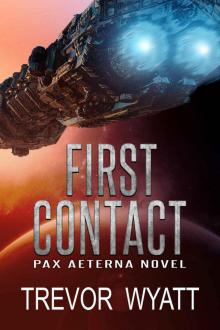 First Contact_A Pax Aeterna Novel
First Contact_A Pax Aeterna Novel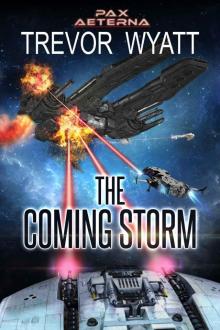 The Coming Storm_A Pax Aeterna Novel
The Coming Storm_A Pax Aeterna Novel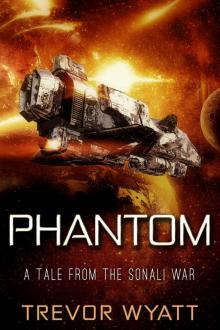 Phantom: A Tale From The Sonali War
Phantom: A Tale From The Sonali War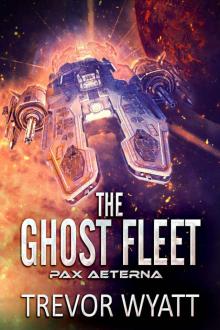 The Ghost Fleet
The Ghost Fleet Sacrifice of Angels
Sacrifice of Angels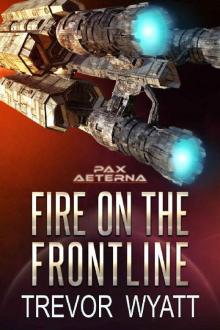 Fire on the Frontline
Fire on the Frontline Sacrifice of Angels: A Pax Aeterna Novel (Pax Aeterna Universe Book 6)
Sacrifice of Angels: A Pax Aeterna Novel (Pax Aeterna Universe Book 6) Homefront
Homefront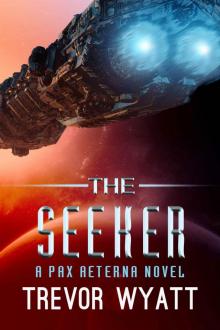 The Seeker: A Pax Aeterna Novel
The Seeker: A Pax Aeterna Novel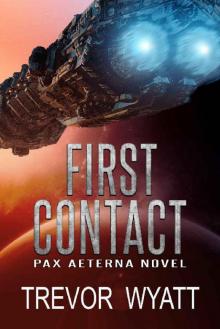 First Contact: A Pax Aeterna Novel (Call of Command Book 1)
First Contact: A Pax Aeterna Novel (Call of Command Book 1)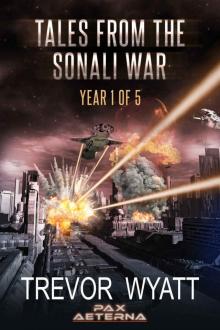 Tales From The Sonali War: Year 1 of 5 (Pax Aeterna Universe Book 4)
Tales From The Sonali War: Year 1 of 5 (Pax Aeterna Universe Book 4) High Crimes
High Crimes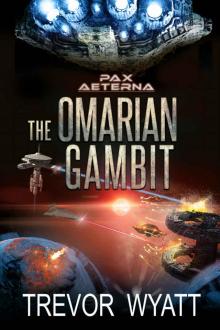 The Omarian Gambit: A Pax Aeterna Novel
The Omarian Gambit: A Pax Aeterna Novel Homefront: A Pax Aeterna Novel (Pax Aeterna Universe Book 3)
Homefront: A Pax Aeterna Novel (Pax Aeterna Universe Book 3) High Crimes: A Pax Aeterna Novel (Pax Aeterna Universe Book 5)
High Crimes: A Pax Aeterna Novel (Pax Aeterna Universe Book 5)